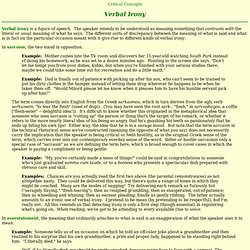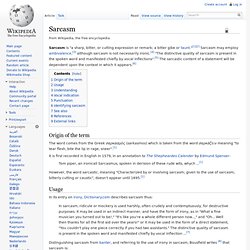

Poetic justice. Examples[edit] Literature[edit] It Shoots Further Than He Dreams by John F.

Knott, March 1918 Television and film[edit] References[edit] How to Live Without Irony. Sincerity, Not Irony, Is Our Age's Ethos. A recent hipster-hating New York Times column got this pop-cultural moment exactly backwards.

Cultural critics love hypothesizing about hipsters. And certainly hipsters make for useful lab rats if you're interested in the culture of young, gentrifying, trendy, affluent, and white college graduates. But it's easy to let this hypothesizing go too far, and you get into trouble when you try to charge hipsters with representing the "ethos of our age. " They're just kids making their way from young adulthood to the rest of their lives. Yet that's exactly what Princeton professor Christy Wampole does in her recent New York Times op-ed, titled "How to Live Without Irony. " If hipsters aren't convincing enough, Wampole offers a second proof that we live in the "age of Deep Irony": advertisements. Across pop culture, it's become un-ironically cool to care about spirituality, family, neighbors, the environment, and the country. Wampole agrees that there's been a shift, but she sees it in reverse.
Situational Irony: Definition & Examples. Verbal Irony: Types. Critical Concepts Verbal Irony Verbal irony is a figure of speech.

The speaker intends to be understood as meaning something that contrasts with the literal or usual meaning of what he says. The different sorts of discrepancy between the meaning of what is said and what is in fact on the particular occasion meant with it give rise to different kinds of verbal irony: In sarcasm, the two stand in opposition. Example: Mother comes into the TV room and discovers her 11-year-old watching South Park instead of doing his homework, as he was set to a dozen minutes ago.
The term comes directly into English from the Greek sarkasmos, which in turn derives from the ugly verb sarkazsein, "to tear the flesh" (used of dogs). Irony in our blind belief of Religion. Scumbag Irony: Congressman Lamar Smith. Examples of Irony. Irony pervades contemporary language.

From its use in sarcasm, comedy and just everyday conversation, irony has long transcended from only being a literary device. Irony can best be defined as that middle ground between what is said and what is meant, or others’ understanding of what was said and what was meant. It can sometimes be a bit confusing, yet at the same time it can also be amusing. There are several examples of irony which can be summed up in various categories. Situational Irony. Ironic Situations: Photo Gallery.
The 3 Most Common Uses of Irony. An Analysis of the Song Ironic. Alanis does get some lines right… In 1995, Canadian singer Alanis Morissette released her album, Jagged Little Pill, which had such memorable songs as Hand in My Pocket, You Ought to Know, and Head Over Feet.

What caught the attention of listeners-from the academic or scholastic field, to the free thinking philosophers of that time, to the non-intellectual laymen-was the song Ironic. What is the difference between dramatic irony and situational irony. Types of Humor. As of July 1, 2013 ThinkQuest has been discontinued.

We would like to thank everyone for being a part of the ThinkQuest global community: Students - For your limitless creativity and innovation, which inspires us all. Teachers - For your passion in guiding students on their quest. Partners - For your unwavering support and evangelism. Dramatic and Tragic Irony. Dramatic Irony. Irony. A stop sign ironically defaced with a plea not to deface stop signs.

Irony (from Ancient Greek εἰρωνεία (eirōneía), meaning "dissimulation, feigned ignorance"[1]), in its broadest sense, is a rhetorical device, literary technique, or event characterized by an incongruity, or contrast, between what the expectations of a situation are and what is really the case, with a third element, that defines that what is really the case is ironic because of the situation that led to it.
The term may be further defined into several categories, among which are: verbal, dramatic, and situational. Verbal, dramatic, and situational irony are often used for emphasis in the assertion of a truth. Sarcasm. Sarcasm is "a sharp, bitter, or cutting expression or remark; a bitter gibe or taunt.

"[1][2] Sarcasm may employ ambivalence,[3] although sarcasm is not necessarily ironic.[4] "The distinctive quality of sarcasm is present in the spoken word and manifested chiefly by vocal inflections".[5] The sarcastic content of a statement will be dependent upon the context in which it appears.[6] Origin of the term The word comes from the Greek σαρκασμός (sarkasmos) which is taken from the word σαρκάζειν meaning "to tear flesh, bite the lip in rage, sneer".[1] The Right Way to Write Wrong > The seven types of sarcasm. A Lesson by Mike Lamb You know what's not funny?

Generic sarcasm. Constantly saying "Yeah right" and "Oh great" doesn't make you witty. It makes you annoying. Everyone thinks they can be a smart a*s. 1. 2. 3. 4. 5. 6. 7. First prev. Satire. Litotes. In rhetoric, litotes (/ˈlaɪtətiːz/,[1] US /ˈlɪtətiːz/ or /laɪˈtoʊtiːz/) is a figure of speech in which understatement is employed for rhetoric effect,[2] principally via double negatives.[3][4] For example, rather than saying that something is attractive (or even very attractive), one might merely say it is "not unattractive".

The use of litotes is common in English, Russian, German, Dutch and French. They are features of Old English poetry and of the Icelandic sagas and are a means of much stoical restraint.[6] The word litotes is derived from the Greek word litos meaning "plain, small or meager".[7]